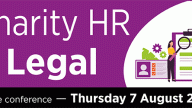HR, EEDI (Equality, Equity, Diversity and Inclusivity) and Wellbeing Hub
Taking a stand for EEDI
In this article, Kalli reminds us of the importance of EEDI in the charity sector and beyond.
Equality, Equity, Diversity and Inclusion (EEDI) initiatives are under attack.
In the US, President Trump has cut billions of dollars in federal grants linked to EEDI, and his crackdown appears to be influencing the UK as well, as is evident in companies like BT choosing to remove diversity measures from their managers’ bonus criteria. EEDI is now facing an existential threat. And the charity sector must act now to counter this erosion of measures. With EEDI in a vulnerable place, now is the time to set the record straight and remind people why it should matter today and every day.
So with that in mind, here are some reminders of why EEDI is important to the charity sector and beyond.
Setting the record straight
EEDI is not about lowering the bar – it’s about two things. Firstly, ensuring that one particular demographic isn’t overly represented. For example, 92% of trustees are White, compared to 83% of the UK population. Secondly, ensuring qualified candidates from underrepresented backgrounds have a fair chance. Read this article about board diversity by our trustee Michaela Clark.
Baroness McGregor Smith’s 2020 review of Race in the Workplace revealed that although people from Global Majority (a term that refers to all ethnic groups except White British and other White groups) backgrounds generally attain similar levels of education as White people, they are more likely to hold jobs for which they are overqualified and underpaid.
Tackling inequalities
The charity sector, like any other, is a space where marginalised groups experience the consequences of systemic injustice. Last year I wrote about the sector’s underrepresentation of women in leadership roles and its slow progress in improving inclusion for employees of the Global Majority. Steps to tackle these inequalities include: reviewing recruitment processes, encouraging and supporting our colleagues with marginalised identities to adopt decision-making roles, and collecting diversity data.
For example, at DSC we conduct anonymous recruitment to reduce bias. Applicants are considered according to the selection criteria only, with names and other identifying features (which can highlight someone’s ethnicity), and age, names of schools and universities being redacted before reviewing candidates for shortlisting. Some organisations, such as ACEVO, publish progress towards diversity targets.
Great Ormond Street Hospital Charity has staff networks that are formed around shared marginalised identities. These networks create safe spaces and help organisations reach their EEDI goals by providing lived experiences and helpful insights.
Raising conversations
If we want effective EEDI practices to become ingrained into workplace culture, an important step to normalise the conversation.
At DSC, we have an EEDI working group open to all colleagues. We meet regularly to agree on action points, such as using inclusive language, or discuss EEDI concerns. It’s a dedicated space to put our commitment to EEDI into action and to support integration of EEDI principles.
While we recognise that not every charity will have the capacity to run an EEDI working group, there are plenty of other ways to promote conversations about EEDI. Sharing relevant articles or resources with colleagues can help spark awareness and reflection. Setting up an informal book club to explore anti-discriminatory literature is another great way to start important conversations.
We recognise that EEDI is a vital framework to tackle systemic injustices. Those core values of equity, equality, diversity and inclusion are, now more than ever, values for all to champion through our behaviors and actions.
For help learning about EEDI and how to integrate it into your charity, visit DSC’s website for free resources on our EEDI and Wellbeing Hub, and to save the date for our 2025 From Here to Diversity conference.


